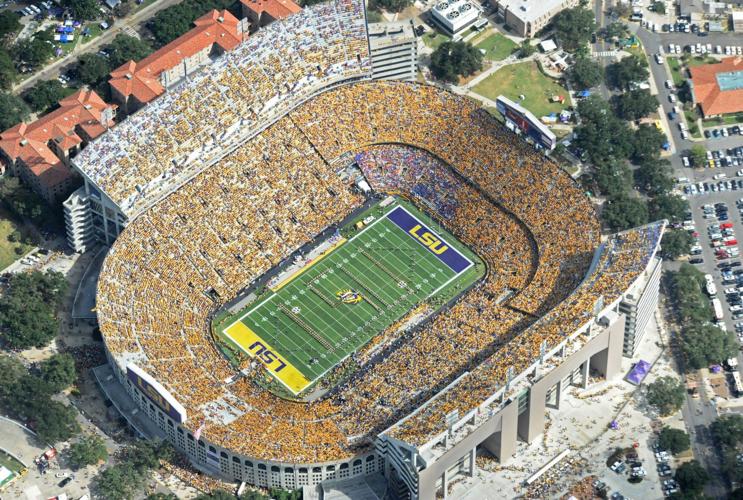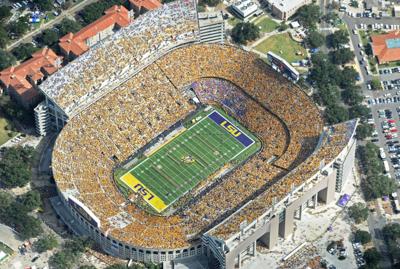This week, reader Jim Thompson Jr. from Daphne, Alabama, asks about Tiger Stadium's long-standing nickname.
“When I was coming to Tiger Stadium as a teenager in the early 1970s, it was sometimes nicknamed ‘Deaf Valley’ because of the crowd noise," he wrote. "When and why was it changed to ‘Death Valley?’ ”
The "Deaf Valley" versus "Death Valley" origin debate has flared up periodically, not to mention passionately, throughout the years. Much of this played out in the column of The Advocate's own Smiley Anders, who has chronicled Louisiana culture and history for 50 years.

The precursor to the gas station on the corner of Highland Road and State Street may play a role in one of LSU football's mysteries.
While there are arguments for both being first, the common consensus appears to be that "Deaf Valley" preceded "Death Valley."
To cite just two examples from Anders' column: "It will always be Deaf Valley to me, and to many of the real, old-time Tigers," Jim Welsh, of St. Francisville, wrote in 2003.
Same goes for Ray Cox of New Roads, writing in 1999. "When I was in LSU Law School in '56-'58, we definitely referred to the stadium as Deaf Valley," he wrote. "That isn't hard evidence, but everyone's ears would be ringing for a couple of hours after a game."
Exactly who first coined the term, and when, is unclear. However, several leading sources, including LSU itself and journalist and radio host Jim Engster, point toward former LSU boxing champion Crowe Peele and his gas station on the corner of Highland Road and State Street as the origin of the moniker.

Fonville Winans' 1947 aerial shot of Tiger Stadium.
For years the station was known by the localized nickname, Deaf Valley Shell — named, apparently, because of the ear-shattering noise that came from nearby Tiger Stadium.
It's fitting that it may be where the "Deaf Valley" term came from, given its proximity to the stadium and, moreover, the pedigree of the man who ran it for 18 years. For Peele wasn't just any boxing champion.
"Thurman Crowe Peele was the greatest boxer in the 25-year history of the sport at LSU," Engster wrote upon Peele's death, at the age of 88, last November.
Peele was a leading member of the powerful LSU boxing program, which was a dominant force in college boxing until LSU disbanded it in 1956. He came to LSU as a four-time Golden Gloves champion with a 62-2 pre-college record. In one of his most notable performances, he went the distance with two-time future heavyweight boxing champion Floyd Patterson at the 1951 Golden Gloves tournament in New York City, losing by split decision.

Advocate staff photo by BILL FEIG -- Aerial of LSU showing the new Tiger Stadium south end zone construction.
He went undefeated in his 16-match career at LSU, forging a reputation as a knockout artist with no shortage of traditional boxing skills.
"Crowe usually relies on the one big blow rather than an advantage on points to win his bouts," a staff writer wrote in a 1955 edition of The Advocate, "but (he) can, when the need arises, box with the best of the ‘Fancy Dans.’ ”
Peele won SEC and Sugar Bowl championships as a freshman in 1954 before repeating as conference champion the following year. In 1955, he won the individual heavyweight title at the NCAA boxing championship, perhaps his finest achievement in the ring.
After leaving LSU, Peele went on to amass a 16-5 professional record (according to the boxing record site Boxrec), served as a sparring partner for light heavyweight champion Archie Moore ... and, of course, possibly gave Tiger Stadium its early nickname.
Quite aside from Crowe Peele, there's another aspect to the Deaf Valley/Death Valley debate.
Clemson's Memorial Stadium is also known as Death Valley, and many claim the shared name is less than coincidental. As does the SEC's own website, which puts it down to one of LSU's most famous football victories.
"On Jan. 1, 1959, when LSU and Heisman Trophy winner Billy Cannon capped the school's first national title with a 7-0 victory in the Sugar Bowl, some of those fans stole 'Death' when describing the home valley," it reads. "Why? Because they believed they had earned that right after defeating the team that was already using the name for its home stadium. Yep, Clemson."
Cheeky.
As for when and why "Death Valley" became the recognized name, Engster points toward 1982 and the arrival of controversial athletic director Bob Brodhead.
"Brodhead emphasized the 'Death Valley' term when he was hired in 1982," Engster wrote. "Brodhead was a former Duke quarterback and familiar with Clemson and the other Death Valley."
Engster said a branding took hold in the 1982 season with a combination of multiple factors:
- LSU designer Don Bruce's original "Eye of the Tiger" logo
- The band Survivor hit the top of the charts with "Eye of the Tiger"
- LSU beat Alabama for the first time in 12 years
- LSU beat Florida State 55-21 on a foggy night at Tiger Stadium
"Brodhead, despite his faults," said Engster, "was a savvy marketer."






